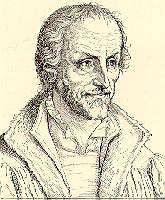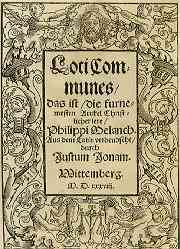





Philipp Melanchthon

Melanchthon next to Luther
Melanchthon quickly settled down in Wittenberg. This was probably largely due to the fact that he had met Martin Luther here. The intense relationship between Melanchthon and Luther changed from collegiality to profound friendship at the university. The following statement by Melanchthon demonstrates just how profound this friendship was: "I would rather die than be separated from this man."Luther quickly persuaded Melanchthon to join the Reformation movement. As colleagues at Wittenberg University, friends, and collaborators in the fight for Reformation, their relationship was always characterized by friendly collegiality (Heinz Scheible).
Melanchthon and Theology
Luther was impressed by the inaugural address this young professor of Greek gave in 1518 at the university in Wittenberg. Melanchthon continued his studies of theology in Wittenberg and received an academic degree in this subject. He gave numerous lectures on biblical subjects and was often consulted by Luther and others as an expert on theological issues.
University Professor
As a University scholar, who was also busy with philosophy, history, medicine and even physics, he gave priority to staying a member of the "lowliest" department, philosophy.
Because of that, Melanchthon was the author students most often read in his time. Some of his works were still being read in 1800 in schools and universities.
Luther introduced Melanchthon to reformed theology, and in return, Melanchthon taught Luther Greek. It was Melanchthon who motivated Luther to translate the Bible into a German understandable for the common people. (See also: Luther at the Wartburg).
Melanchthon's Role in Religious Disputes and Negotiations
Melanchthon was already present at the first serious dispute between Luther and the roman church, the 1519 Debates in Leipzig. During the argument with Johannes Eck, an astute Papal theologian, Melanchthon wrote little notes to Luther citing Bible passages contradicting the preeminent position of the Pope--the contended issue in the debate.
Melanchthon was also an important colleague for Luther in later negotiations, for example, if Luther could not appear, Melanchthon became the leader of the protestans.
 Luther, the prophet among the Reformers, worked tirelessly on his new
theology, but he often lacked a systemized approach. In 1521
Melanchthon took over this task, writing the first valid summary of
reformed theology, the "Loci Communes." Luther felt so enthusiastic
about this book that he even wanted to include it in the Bible.
Luther, the prophet among the Reformers, worked tirelessly on his new
theology, but he often lacked a systemized approach. In 1521
Melanchthon took over this task, writing the first valid summary of
reformed theology, the "Loci Communes." Luther felt so enthusiastic
about this book that he even wanted to include it in the Bible.
During the Congress of Augsburg in 1530 Melanchthon championed the
cause of Reformation because Luther was unable to leave the Electorate
of Saxony (Kursachsen) due to his excommunication. Melanchthon
mastered the difficulties of negotiating with the roman - Catholics
well.
Based on several already completed writings and on the negotiations of
Augsburg, Melanchthon wrote the first great confession (confessio) of
the Reformation the "Augsburg confession" (Confessio
Augustana). Evangelical priests to this day
are ordained with this confession.
After Luther's death, Melanchthon became the spokesman of the Reformation. Even though his position was not entirely undisputed, Melanchthon nevertheless remained an outstanding spokesmen of the German Reformation until his own death.
Short biography:
- 1497 Melanchthon (at this time still Schwarzerd) was born in Bretten
- 1509 attended the University of Heidelberg
- 1511 Baccalaureat (first academic degree)
- 1512 moved to Tübingen
- 1514 Master of Arts (Magister artium)
- 1518 arrived in Wittenberg as the Professor of Greek; highly respected inaugural speach
- Melanchthon took part in all important protestant negotiations
- he is Luther's most important collaborator
- He introduced a huge school and university reform in the electorate of Saxon which became a model for other countries.
- He wrote the "Loci communes" (first protestant dogmatics in 1521) and the "Confessio Augustana" (confession of the reformation, 1530).
- After Luther's death he became the leader of the reformation.
- 1560 he died in Wittenberg
This is why he is called "Germany's Principal Teacher" (Praeceptor Germaniae)
Further information can be found at: www.melanchthon.de.


Remarks, critique, praise to theWebmaster (2002-06-05).